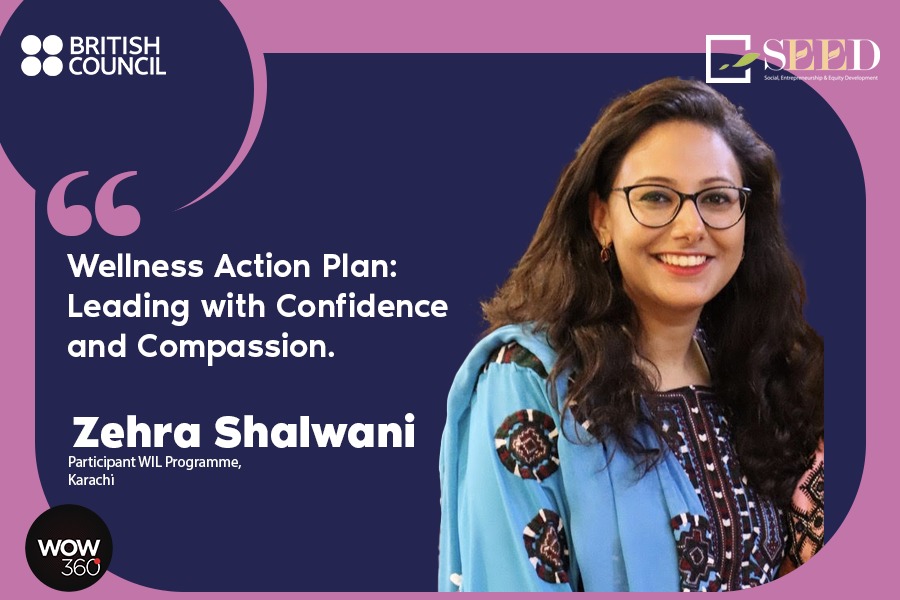As a part of our Women in Leadership Programme, we had the pleasure of speaking with Zehra Shalwani, a dynamic entrepreneur who has made a name for herself in the travel industry.
Her impressive career has spanned various industries, but her leadership style has remained confident and compassionate throughout.
Shalwani shares valuable insights on the importance of personal well-being, the balance between competing priorities, and the strategies she has found effective in supporting her team’s mental and physical health.
“I used to believe that overworking and working all the time was the key to success,” Zehra Shalwani admits. “However, the Wellness Action Plan in Clore’s Social Leadership training helped me realize that work-life balance is crucial for personal well-being,” she says.
One of the leadership training modules offered by Clore Social for the Women in Leadership programme centres on personal well-being and achieving work-life balance for women in leadership positions.
Also Read:
Empowering Women Leaders in Pakistan: The Role of ‘Personal Why’ in Leadership Positions
This module aims to address concerns related to balancing professional responsibilities while avoiding burnout, providing valuable insights on how programme participants can achieve success without sacrificing their personal well-being.
“If you are not doing physically or mentally well, then everything will affect you in a negative way,” she says. Zehra Shalwani now takes breaks and doesn’t work on weekends unless it is something urgent, which has allowed her to give herself more space and time.
For Shalwani, personal well-being is not just about giving yourself time; it is also about pampering oneself and being positive. “Personal well-being is about being happy with who you are,” she adds.
Shalwani finds the concept of feminist leadership particularly interesting, as it counters traditional, aggressive leadership roles.
“What I learned from this module was that feminist leadership is counter to the aggressive, traditional leadership roles that we have seen around us. It is something that is flexible and evolving. You don’t always have to be bureaucratic in your leadership approach, you can actually empower others just by being flexible in your approach,” she says.
Regarding the Wellness Action Plan, Shalwani explain that the SWOT analysis helped her in identifying her personal triggers for stress and burnout.
“To manage stress and avoid burnout, I have learned to divide my work and delegate tasks to avoid over-committing myself,” she says. “I am now unapologetic when taking my time to avoid burnout risks.”
When balancing the demands of her leadership role with personal well-being, Shalwani highlights that she fluctuates between her roles and handles multiple responsibilities well.
However, she emphasizes the importance of open and honest relationships between leaders and team members when encouraging well-being. “Leaders should be approachable and empathetic, and team members should feel empowered to say when they need a break,” she says.
Also Read:
“Enabling Ecosystems Build Leadership” Fatima Arshad, Unilever
When faced with competing priorities and deadlines, Zehra Shalwani practices self-care by working from home, eating healthily and taking breaks during office hours. “When I have competing priorities and deadlines in my work, I manage my self-care by doing my tasks online because of which I get the flexibility of working from home,” she says.
She also takes time off when needed, as exemplified by her team’s decision to take a few days off after returning from a hectic exhibition in Germany.
“My team and I went to this exhibition in Germany earlier this month and the trip became so hectic that everyone took a few days off after we returned to Pakistan. All of us are resuming work this week. This approach should be made normal because you cannot work all the time, it’s just not possible,” says Shalwani.
Her experience highlights the importance of personal well-being ineffective leadership and the need to address gender inequality in the workplace.
Shalwani’s journey towards prioritizing personal well-being offers valuable insights into effective leadership. Her experiences in the Women in Leadership Programme highlight the importance of taking breaks, delegating tasks, and being mindful of personal triggers for stress and burnout.
As a result, Zehra Shalwani’s leadership style remains both confident and compassionate. The British Council’s WIL Programme is an essential initiative in empowering women like Shalwani to reach their full potential as leaders in a rapidly changing world.
This article has been contributed by :
Tehreem M. Alam, Comms Manager SEED Ventures
Disclaimer:
The articles, podcasts, and impact videos by WOW360 (in strategic partnership with SEED Ventures ) serve as additional learning material for the British Council Women in Leadership (WIL) Programme.
These materials provide a local context that is essential for participants to have a deeper understanding of the content they have learned. They also offer diverse perspectives on how leadership is reflected at the grassroots level, and at higher management and are designed to benefit both facilitators and participants of the WIL Programme
The interviewee is a participant in the WIL Programme.
